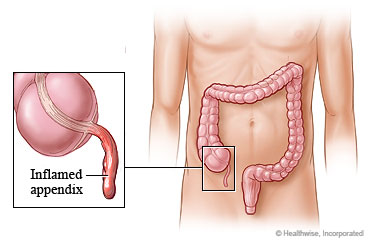Learning About Appendectomy in Children
What is an appendectomy?

An appendectomy is surgery to take out the appendix. This organ is a small sac that is shaped like a finger.
It's attached to the large intestine.
Appendicitis happens when the appendix becomes infected and inflamed. An appendectomy is the main treatment
for it. If surgery is delayed, the inflamed appendix may burst. A burst appendix can cause serious health
problems.
If the appendix has burst, your child may need an emergency surgery to remove the burst appendix.
How is this surgery done?
Before surgery, your child will get medicine to make them sleep.
Appendectomy is usually done as a laparoscopic surgery. That means it is done with only small cuts. These
cuts are called incisions. The doctor puts a lighted tube, or scope, and other surgical tools through the cuts
in your child's belly. The doctor is able to see the organs with the scope. The doctor removes the appendix.
The cuts heal quickly, and the scars usually fade over time.
In some cases, the surgery is done through a single larger cut in the belly. This is called open surgery.
What can you expect after surgery?
Most children leave the hospital 1 or 2 days after surgery. Some even go home the same day.
Your child may feel weak and tired for several days after going home. Your child's belly may be swollen and
painful. Your child may also have nausea or vomiting. Some children have diarrhea, constipation, gas, or a
headache. These problems usually go away in a few days. If the surgery was laparoscopic, your child may have
shoulder pain. This is caused by the air the doctor put in your child's belly to help see the organs better.
The pain may last for a day or two.
Most children are back to many of their usual activities about a week after surgery. Your child's body will
work just fine without an appendix. You won't have to make any changes in your child's diet or daily life.
After surgery, be sure to follow your doctor's advice about problems to watch for. These may include fever,
worse belly pain, or problems with your child's incision.
Follow-up care is a key part of your child's treatment and safety. Be sure to make and go to all
appointments, and call your doctor if your child is having problems. It's also a good idea to know your
child's test results and keep a list of the medicines your child takes.
Current as of: July 26, 2023
Content Version: 14.0
Care instructions adapted under license by your
healthcare professional. If you have questions about a medical condition or this instruction, always ask
your healthcare professional. Healthwise, Incorporated disclaims any warranty or liability for your use of
this information.